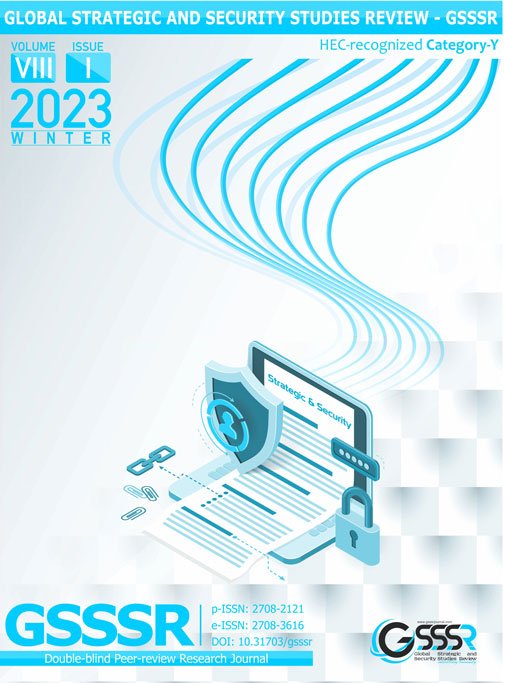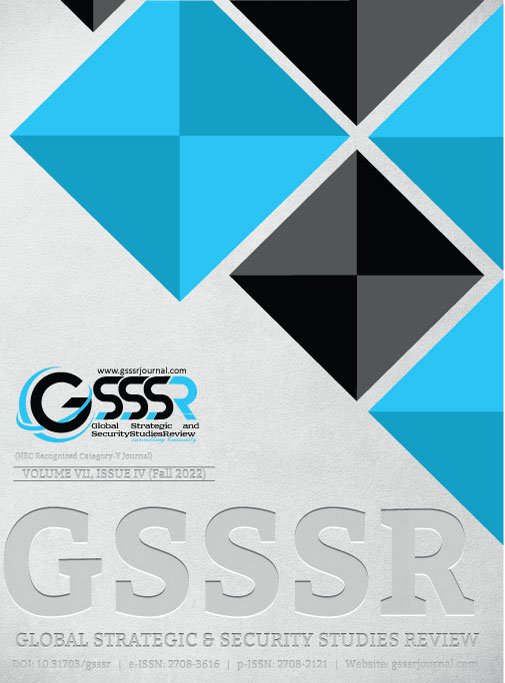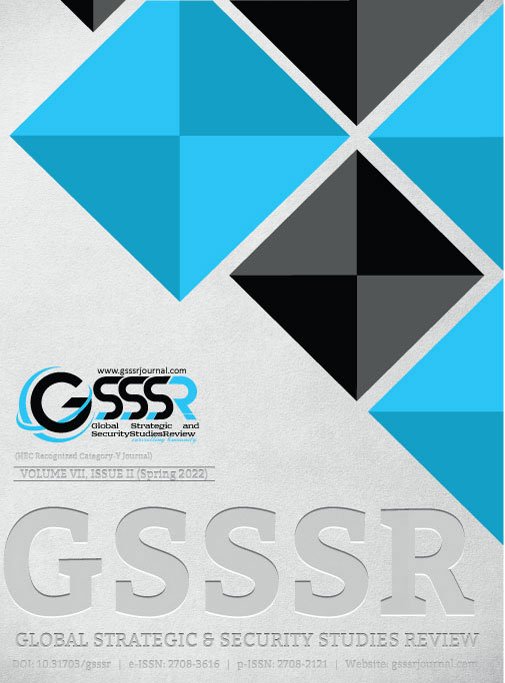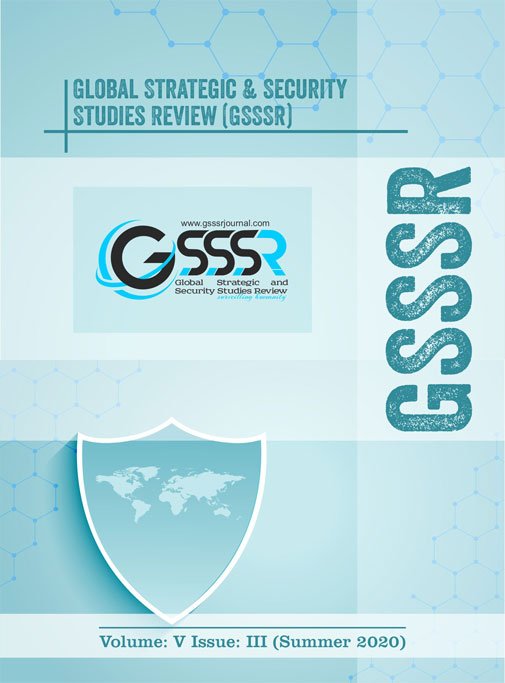01 - Pakistan-China Strategic Relations in the Context of Geopolitical Dynamics of th
http://dx.doi.org/10.31703/gsssr.2022(VII-I).0110.31703/gsssr.2022(VII-I).01 Published : Mar 2022
-
The international system is strongly influenced by economic globalization in the 21st century. During this century, the emergence of regionalism is strengthened, and regional alliances are considered as security to the so-called modern "Cliche of Globalization." In the current study, relations between Pakistan and China are discussed in light of enhanced regionalization in the Indian Ocean Region ... Details
-
CPEC, Maritime, Indian Ocean, QUAD, Geopolitics
-
(1) Sumaira Rehman
Ph.D. Scholar, Department of Political Science, University of the Punjab, Punjab, Pakistan.
(2) Rana Eijaz Ahmad
Professor, Department of Political Science, University of the Punjab, Punjab, Pakistan.
02 - The Doctrine of Use of Force in Self-defense and International Law: Prospects an
http://dx.doi.org/10.31703/gsssr.2022(VII-I).0210.31703/gsssr.2022(VII-I).02 Published : Mar 2022
-
The law on "Use of Force in Self-Defense under International Law" aims to secure both state sovereignty and international peace. This is not only one of the most significant doctrines developed by the United Nations (UN) but is also most challenging to implement in true spirit as its interpretation often get spoliticised. The controversies spark not on the legality of self-defense but on proper id... Details
-
Use of Force, Self-Defense, International Law, Human Rights, Obligations
-
(1) Sardar M.A. Waqar Khan Arif
Assistant Professor, Department of Law, Faculty of Social Sciences and Humanities, University of Kotli, Azad Jammu and Kashmir, Pakistan.
(2) Bushra Bannian
Lecturer, Department of Law, Faculty of Social Sciences and Humanities, University of Kotli, Azad Jammu and Kashmir, Pakistan.
(3) Syed Mudasser Fida Gardazi
Assistant Professor, Department of Law, University of Azad Jammu and Kashmir, Muzaffarabad, AJK, Pakistan.
03 - Hydro-Politics of Trans-Boundary Water Resources in South Asia: A Water- Energy-
http://dx.doi.org/10.31703/gsssr.2022(VII-I).0310.31703/gsssr.2022(VII-I).03 Published : Mar 2022
-
Water is a vital resource for 1.9 billion, 24.89 Percent of the total world population residing in the South Asian states and the geopolitics of the region primarily is hydro-politics. The water geography of the region comprises river basins like the Indus, Ganges, Meghna, and Brahmaputra, acting as capillaries responsible for the flow of life in this gigantic region. Allocation of water resources... Details
-
Hydro-politics, South Asia, National Security, Human Security
-
(1) Muqarrab Akbar
Professor/ Chairman, Department of Political Science, Bahauddin Zakariya University, Multan, Punjab, Pakistan.
(2) Rafida Nawaz
Assistant professor, Department of Political Science, Bahauddin Zakariya University, Multan, Punjab, Pakistan.
(3) Syed Hussain Murtaza
Ph.D. Scholar, Department of Political Science, Bahauddin Zakariya University, Multan, Punjab, Pakistan.
04 - Pragmatic Model of Countering Violent Extremism for Pakistan
http://dx.doi.org/10.31703/gsssr.2022(VII-I).0410.31703/gsssr.2022(VII-I).04 Published : Mar 2022
-
Violent extremism has become a constant threat to the stability and very existence of the state of Pakistan. State adopted the foreign approaches and models to deal with the violent extremism without understanding the local environment and the drivers of violent extremism. The indiscriminate applications of traditional approaches without taking into account contextual model have made all the attem... Details
-
Violent Extremism, Violence, Countering Violent Extremism, Model, Peace
-
(1) Muhammad Ejaz
Assistant Professor, Government Postgraduate College Mansehra, KP, Pakistan
(2) Waqas Ahmed
Lecturer, Government Postgraduate College Mansehra, KP, Pakistan
(3) Jamshed
PhD Scholar, Department of Political Science, Qurtuba University of Science & Information Technology, Dera Ismail Khan, KP, Pakistan.
05 - British Colonial Imperialism and Pashtun Resistance under Islamic Jihad: An Anal
http://dx.doi.org/10.31703/gsssr.2022(VII-I).0510.31703/gsssr.2022(VII-I).05 Published : Mar 2022
-
This paper attempts to analyze the British Colonial Rule in the Indian North-West Frontier Region with respect to the Islamic Jihad led by Pashtuns tribes at Umbeyla (Buner) in 1863. The British annexation of this region resulted in bringing the Pashtoons into direct contact with their new master. Afterwards, the British launched almost sixty expeditions against the tribes of this region between 1... Details
-
North West Frontier, Expedition, British, Pashtuns, Umbeyla, Malka
-
(1) Ibrar Hussain
PhD scholar, School of World History, Politics and International Relation Northwest University, Xian, China and Lecturer Abasyn University Peshawar, KP, Pakistan
(2) Wang Xingang
Professor, School of History, North-West University, Xi an, China
(3) Aroosa Fatima
Lecturer, Political Science at Bahria university Lahore, Punjab, Pakistan.
06 - Indian Exploitation of Kashmir Through the Phenomenon of Terrorism: A Case Study
http://dx.doi.org/10.31703/gsssr.2022(VII-I).0610.31703/gsssr.2022(VII-I).06 Published : Mar 2022
-
The genesis of conflict roots back to the exploitation of the Muslim majority by the Hindu rulers from1846 on-wards. Conflict broke out between India and Pakistan in 1947 as India took the matter to the UNSC which decided on a plebiscite to determine the will of the people. After the initial agreement, India slowly deviated to portray Kashmir as her internal issue. Having failed to suppress Kashmi... Details
-
Kashmir, Right of Self-determination, United Nations, India, Pakistan, Terrorism, State Terrorism, Discourse
-
(1) Raja Wasim Shahid
PhD Scholar, Centre for International Peace and Stability (CIPS), National University of Sciences and Technology (NUST), Islamabad, Pakistan.
07 - The Promulgation of Hindutava Ideology under Secularism's Curtain in the Modi Er
http://dx.doi.org/10.31703/gsssr.2022(VII-I).0710.31703/gsssr.2022(VII-I).07 Published : Mar 2022
-
The research article addresses the underline reason for opting for Secularism in India by Nehru.Nehru knew India was a home of people from different cultures, languages, religions, and ethnicities. So,choosing one religion, i.e., Hinduism, would create problems for the rest of the religions, and in the future other religions may ask for a separate country. An aggressive reaction was seen by other ... Details
-
Hindutva, Secularism, RSS, Modia Era, Gandhi
-
(1) Hajra Nasir
Research Scholar, Department of International Relations, COMSATS, Islamabad, Pakistan.
(2) Mariam Asif
Lecturer, National Institute of Pakistan Studies, Quaid-i-Azam University, Islamabad, Pakistan.
(3) Saima Gul
Lecturer, Department of International Relations, University of Peshawar, KP, Pakistan.
08 - Theorizing Religious Extremism: Causes and Impacts
http://dx.doi.org/10.31703/gsssr.2022(VII-I).0810.31703/gsssr.2022(VII-I).08 Published : Mar 2022
-
Extremism is a great threat to the security of Pakistan. The growing extremism is affecting all fields of life. In Pakistan, many people have been killed in sectarian violence. Since independence, Pakistan has been confronting the problems of ethnonationalism, sectarianism and extremism. Furthermore, after 9/11 Pakistani society faced a lot of problems due to religious extremism. With the passage ... Details
-
Extremism, Sectarianism, Government, Madrassa, Impacts, Zarb-e-Azab
-
(1) Fozia Bibi
Assistant Professor, Department of Political Science, Rawalpindi Women University, Rawalpindi, Punjab, Pakistan.
(2) Qaiser Iqbal
Visiting Lecturer, Department of IR, Abdul Wali Khan University, Mardan, KP, Pakistan.
(3) Abia Yousaf
Incharge of Economics, Department of Finance, International Islamic University, Islamabad, Pakistan.

 Volume X, Issue I (Winter 2025)
Volume X, Issue I (Winter 2025)  Volume IX, Issue III (Summer 2024)
Volume IX, Issue III (Summer 2024)  Volume IX, Issue II (Spring 2024)
Volume IX, Issue II (Spring 2024)  Volume IX, Issue I (Winter 2024)
Volume IX, Issue I (Winter 2024)  Volume VIII, Issue IV (Fall 2023)
Volume VIII, Issue IV (Fall 2023)  Volume VIII, Issue III (Summer 2023)
Volume VIII, Issue III (Summer 2023)  Volume VIII, Issue II (Spring 2023)
Volume VIII, Issue II (Spring 2023)  Volume VIII, Issue I (Winter 2023)
Volume VIII, Issue I (Winter 2023)  Volume VII, Issue IV (Fall 2022)
Volume VII, Issue IV (Fall 2022)  Volume VII, Issue III (Summer 2022)
Volume VII, Issue III (Summer 2022)  Volume VII, Issue II (Spring 2022)
Volume VII, Issue II (Spring 2022)  Volume VII, Issue I (Winter 2022)
Volume VII, Issue I (Winter 2022)  Volume VI, Issue IV (Fall 2021)
Volume VI, Issue IV (Fall 2021)  Volume VI, Issue III (Summer 2021)
Volume VI, Issue III (Summer 2021)  Volume VI, Issue II (Spring 2021)
Volume VI, Issue II (Spring 2021)  Volume VI, Issue I (Winter 2021)
Volume VI, Issue I (Winter 2021)  Volume V, Issue IV (Fall 2020)
Volume V, Issue IV (Fall 2020)  Volume V, Issue III (Summer 2020)
Volume V, Issue III (Summer 2020)  Volume V, Issue II (Spring 2020)
Volume V, Issue II (Spring 2020)  Volume V, Issue I (Winter 2020)
Volume V, Issue I (Winter 2020)  Volume IV, Issue I (Fall 2019)
Volume IV, Issue I (Fall 2019)  Volume III, Issue I (Fall 2018)
Volume III, Issue I (Fall 2018)  Volume II, Issue I (Fall 2017)
Volume II, Issue I (Fall 2017)  Volume I, Issue I (Fall 2016)
Volume I, Issue I (Fall 2016)